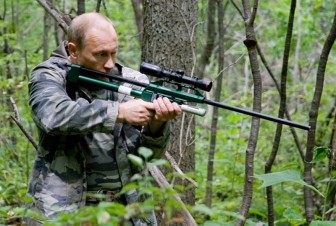Can the worst of times for media and political freedoms in post-Soviet Russia also be the best of times for watchdog reporting?

Premiere.gov.ru. (Creative Commons license)
Putin aims a tranquilizer gun at a tiger in a nature reserve.gov.ru. (Creative Commons license)
Elizaveta Osetinskyaya, the editor of Forbes Russia, the most prominent business magazine in that country, seemed to think so. It’s a paradox, she said. The Russian media is confronting some of the most formidable political and financial challenges it has faced since the fall of communism. Yet she thinks investigative reporting has never been more vibrant nor its quality better. “Nowadays you can’t hide anything,” she said,” the declarations of officials, their assets overseas, you cannot even hide your offshore accounts.”
“Second,” she continued, “Western [media] brands came to Russia in the end of the 1990s and the early 2000s, bringing high standards and technologies for investigative journalism. I started as a journalist in 1995. A lot of investigative pieces at that time came from leaks from oligarchs. This is not the way I would prefer to find information myself. Nowadays that is more possible than before. Third, despite more restrictive laws, there are now more clear and transparent rules [for businesses and for officials], such as international standards of accounting. Now we have a lot of databases. We have information about tenders. You can find a lot of information about the schemes of private companies. Fourth, there are a lot of independent bloggers who help us do our jobs.”
Osetinskaya was speaking at Columbia’s Harriman Institute, which brought in brought in five of Russia’s leading muckrakers in a forum last week. Put five Russian investigative journalists together in a room and you’re bound to have fireworks. The consensus: Vladimir Putin is bad news for for the Russian press. Since his election to a third term last year, the State Duma has recriminalized defamation and passed new laws that would authorize state censorship of critical websites. There is now far less tolerance for critical reporting than there was during the previous president, Dmitry Medvedev. At the same time, violent assaults on journalists continue.
So it was no surprise that others didn’t quite share Osetinskaya’s optimism. Elena Milashina has been for 16 years an investigative journalist for the independent newspaper Novaya Gazeta, where she continues the work of her slain colleague Anna Politkovsyaka, reporting on Chechnya and also investigating attacks on journalists. Last year, Milashina was attacked and beaten up by unknown men while on her way home. The beatings were so severe, she suffered a concussion, 14 blood clots and a broken tooth.
“I don’t write often about Chechnya right now because it’s extremely hard,” she said. “I think twice, several times, because nobody can give [sources] guarantees and protect them.” She wrote a blog post, she said, quoting a female student in Chechnya who posted a letter on Facebook about the increasing pressures on women there. A young woman, the letter said, could be questioned by the police for walking on the streets with a man. The media reported on the letter, confirming its authenticity without naming the student who wrote the post. But Chechen secret service traced her and she was fired from her job.
“It’s so complicated to write about Chechnya nowadays, and I am not even talking about human rights violations. Killings and kidnappings continue, but people don’t complain to the police anymore because they don’t trust them, so nothing can be investigated,” Milashina added. “There are people willing to talk, people in Chechnya who cannot keep their mouth shut. The only thing that is stopping me from publishing is I cannot protect their lives.”
Yet Milashina continues to do her work. Her newspaper is not in great financial shape, she said, and she sometimes had to spend her own money to do reporting. Independent media is facing not just political, but also financial, pressures as audiences migrate online. Some of them have closed down. “Several editors say that it’s the toughest time for them since they opened,” said Nataliya Rostova, senior correspondent for the Russian news site, Slon.ru. ”During the recent protests and elections, there was a lot of pressure on media owners.”
Still independent voices like those of Echo of Moscow, the acclaimed radio station and website that is said to be the last bastion of free media in Russia, are thriving. It’s partly because they are Exhibit A for Putin’s claim that Russia still has a free press.
There are other venues for exposure journalism, including a weekly investigative TV show called, “Corruption on the Rain.” Ivan Ninenko is co-anchor of that program and also deputy director of Transparency International-Russia. His group has put up a website called askjournal.ru, a portal where citizens can ask questions about corruption, and is setting set up another site where the financial declarations of officials will be posted. While these declarations are supposed to be public, they are hard to access. Some government agencies hide them deep in their websites where they are impossible to find or put them up for a few months before taking them down.
Ninenko’s mixed success reflects the paradox of Russia. On one hand, it’s easier for him and others uncovering corruption to publish exposés and information online. On the other hand, officials are more aggressive about suing and they often have the law on their side. “Even if you have solid facts,” he said, “the Russian court system is constructed in such a way that you can still be sued.”
Ninenko’s reporting has shown how absurd things have become. For example, he discovered errors in the official Russian translation of the UN Convention Against Corruption. The Convention says that states should consider libel reform as part of anticorruption legislation. The Russian version says the opposite: states should consider introducing libel law as part of anticorruption legislation.
Unsurprisingly, corruption exposés seldom yield results. “Even if you write a lot, they can be totally ignored. No investigation takes place. There is no political will,” Yet, he said, some reports go viral on the web, prompting change. In February, a blogger wrote that the head of the ethics committee in the Russian parliament had a $1.3-million apartment in Miami and other property but did not declare these in his asset statement. The post went viral on the web and the official resigned.
“There is a change in public attitudes,” said Ninenko. “In the past, no one cared. Now the public is starting to care and that is quite interesting.”
But with Putin firmly at the helm, the politics has become so polarized, especially since last year’s massive anti-government protests. Journalists themselves have taken sides. “It’s a hard time for objective journalism,” said Rostova. “Some journalists are political activists. The role of opinionated journalism has grown a lot. Some journalist are organizing protests as well.”
“There are a lot of challenges,” she said. “But we still have hope.”
 Sheila Coronel is director of the Stabile Center for Investigative Journalism at Columbia University, and is the former executive director of the Philippine Center for Investigative Journalism. This is reprinted from her blog, Watchdog Watcher.
Sheila Coronel is director of the Stabile Center for Investigative Journalism at Columbia University, and is the former executive director of the Philippine Center for Investigative Journalism. This is reprinted from her blog, Watchdog Watcher.

